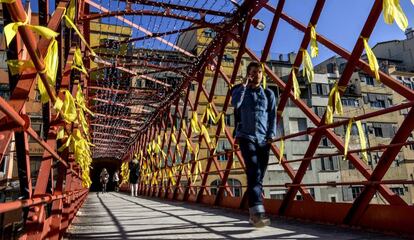The false excuses of the Catalan pro-independence movement
Separatist leaders had long been promising a resounding response to the Spanish government, something that they now deny
The claims of the pro-Catalan independence forces have proved to be false in many different areas, whether it be the international recognition that they guaranteed would be forthcoming, or the confidence of the business and finance sectors. The pretext now being used by politicians and activists alike to their voters for the failure of the process is that the Catalan regional government and its parties had not anticipated the actions of the courts and the police, accusing the government of violence and measures more suited to an authoritarian regime than a modern democracy. But the truth of the matter is that, since 2016, pro-independence leaders have been endlessly promising that, whatever the powers of the Spanish state did, secession would be guaranteed if that was the outcome of the illegal October 1 referendum that went ahead in the region.

The arrests of the heads of the pro-independence associations Catalan National Assembly (ANC) and Òmnium, as well as the pre-trial detention of eight former Catalan government ministers, has been met with apparent surprise by the pro-secession forces, but the ousted regional premier, Carles Puigdemont, clearly stated in interviews with German daily Die Welt and news agency Bloomberg in 2016 that he was ready to end up in jail for his cause. “I’m ready to take this all the way, even if I have to pay that price,” he said. Puigdemont is currently in Brussels, awaiting possible extradition to Spain to face charges of sedition, rebellion and misuse of funds.
I’m ready to take this all the way, even if I have to pay that price
Ousted Catalan premier Carles Puigdemont
Jordi Baiget, a member of the Catalan government until July last year, said at the time that he was willing to go to jail, but not risk losing his assets. The interview, in which Baiget also questioned the unilateral approach to independence for Catalonia, led to his sacking. His substitute, Santi Vila, also said last September – on this occasion during a party rally – that he was prepared to go to jail. “In the coming days they could arrest us or we could be sent to jail, and I’m prepared to accept that,” he said. When it came to it, however, Vila resigned from his position after Puigdemont’s last-minute decision not to call elections and to press ahead with a unilateral declaration of independence, a move that saw him escape pre-trial custody on payment of €50,000 bail.
The police charges seen during the October 1 referendum also appear to have been anticipated by the pro-secession movement. Former regional premier Artur Mas said in February: “We should have a plan for organized mobilizations that will make it very difficult for the state to stop the referendum, or that will see it have to pay an enormous price to stop it.” The former regional health minister, Toni Comín, backed this view in an interview with the daily Ara: “The state will have to be repressive and people will not stay at home.” Quim Arrufat, the leader of the anti-capitalist CUP party, explained in 2016 that this “repression” was the objective: “We have to make the state enter into an anti-democratic contradiction so that it has to resort to some type of legal or brute force […] so that it has to repress, if it wants to repress, right up to the ultimate consequences.”
The thesis of having everything under control, which is now being denied, was maintained until October. At a conference in Brussels on October 18, the then-foreign minister in the Catalan government, Raül Romeva, stated: “Whatever the state does, we will not give in; we have no alternative.”
The police charges at the referendum appear to have been anticipated by the pro-secession movement
The acts of propaganda prior to October 1 were many, and promised the creation of a Catalan republic no matter what the central government in Madrid did. The former spokesperson for the regional government, Jordi Turull, said 10 days before Article 155 was invoked: “The state is presenting us with the following terms: either we surrender, or we press on. Obviously surrender does not form part of any of the scenarios of this government. The commitment to the mandate of October 1 is absolute, it’s complete. […] I can assure you that we will not stop nor will we stop to see them occupy Catalan institutions.”
The former interior chief, Joaquim Forn, said at a rally on September 21, a day after the arrests relating to the interference with a police operation to seize material related to the referendum: “It is up to us to win and to achieve our dream of independence.” The same day, deputy Antoni Castellà said: “This only depends on us. We have a historic opportunity.” And on September 20, the currently jailed head of the pro-independence Òmnium association, Jordi Cuixart, tweeted: “The state is assaulting our institutions and will go as far as we let it.”
The bravado was constant. Puigdemont warned in July that the Spanish state could only impede independence if it came up with a better proposal. The former minister for the presidency, Francesc Homs, stated in February that if “there was a penal response to a peaceful and democratic process, it would be the end of the Spanish state.” On September 14, at a rally in Tarragona that marked the start of the October 1 campaign, the head of the Catalan Republican Left (ERC), Marta Rovira, said that she had a message for those who made daily threats and warnings of catastrophes: “There is no turning back on the path toward the Catalan republic.”
Puigdemont warned in July that the Spanish state could only impede independence if it came up with a better proposal
The assurances that everything was under control on the part of the pro-independence forces, whatever the Rajoy government did, were constant during 2016. The ERC deputy in Congress, Joan Tardà, in particular would repeat these claims. In May of that year he said: “If we don’t mess this up, we will win. If we chicken out and betray the people, we will lose. For the first time in history everything depends on us, for the first time what happens in Madrid will be of secondary importance. They can make things difficult for us, but it all depends on us.” And in February 2016, on La Xarxa TV, he said: “For the first time in 200 years, everything, but everything, depends only on us.”
Tardà wasn’t the only member of ERC to use that slogan. It was also voiced by Santi Vila in 2016, and by the Republican deputy in Congress, Teresa Jordà, who said in April 2016 that nothing depended on the Spanish state. “It only depends on us, and on our commitment to building a Catalan republic.” The republican spokesperson in the Senate, Mirella Cortès, wrote last June: “Every day we are closer. No one will stop us. Not the threats of Rajoy or anything else.”
English version by Simon Hunter.
Tu suscripción se está usando en otro dispositivo
¿Quieres añadir otro usuario a tu suscripción?
Si continúas leyendo en este dispositivo, no se podrá leer en el otro.
FlechaTu suscripción se está usando en otro dispositivo y solo puedes acceder a EL PAÍS desde un dispositivo a la vez.
Si quieres compartir tu cuenta, cambia tu suscripción a la modalidad Premium, así podrás añadir otro usuario. Cada uno accederá con su propia cuenta de email, lo que os permitirá personalizar vuestra experiencia en EL PAÍS.
¿Tienes una suscripción de empresa? Accede aquí para contratar más cuentas.
En el caso de no saber quién está usando tu cuenta, te recomendamos cambiar tu contraseña aquí.
Si decides continuar compartiendo tu cuenta, este mensaje se mostrará en tu dispositivo y en el de la otra persona que está usando tu cuenta de forma indefinida, afectando a tu experiencia de lectura. Puedes consultar aquí los términos y condiciones de la suscripción digital.









































